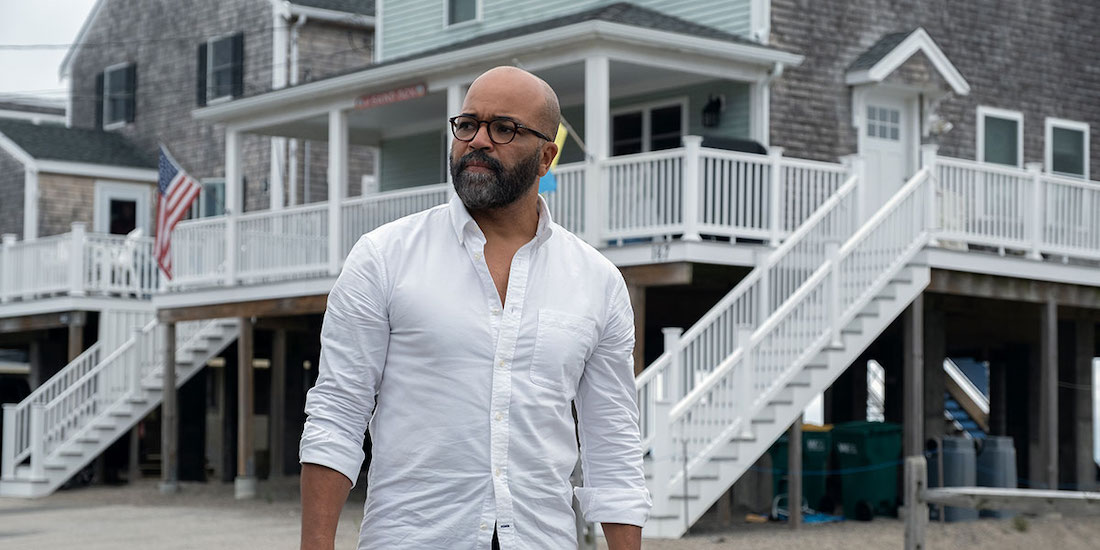
By most measures, American Fiction shouldn’t have worked. It seems like two films jammed together—one a satirical takedown of diversity initiatives and liberal white guilt, the other a domestic dramedy about a misanthropic writer trying to connect to his well-off family. In other words, think Jordan Peele meets Nancy Meyers. And yet, somehow, newcomer Cord Jefferson’s film does work—and in fact feels thrillingly fresh and new.
Our hero is Thelonius “Monk” Ellison (Jeffrey Wright, pure perfection), a novelist of high-brow fiction who hasn’t been published in a while (his latest book is being bounced from publishing house to publishing house and has been rejected for not being “Black” enough) and a professor out of touch with his increasingly woke students. (In an early scene, he puts the N-word on the blackboard. A white student objects to it. “If I can handle it, so can you,” Monk says drily. She is unmoved.)
Because of that encounter, and others like it, Monk is forced to go on an unpaid leave of absence. His boss at the university suggests he spend some time with his family to “relax.” Monk scoffs at that notion.
But he does go home, to Boston, where we meet his recently divorced, wise-cracking sister, Lisa (Tracee Ellis Ross), his somewhat spiraling, just-out-of-the-closet younger brother, Clifford (Sterling K. Brown), and his widowed mother (Leslie Uggams), who is showing early signs of Alzheimer’s. There’s also an all-seeing housekeeper named Lorraine (Myra Lucretia Taylor), who is very much part of the family. We find out that Monk was closest to his father, who was also withholding and stern, and that after his father’s death, he drifted away from his family. They’re happy to be with him, and just wish he would open up more emotionally.
The turning point for Monk’s career comes when he attends a reading by Sintara Golden (Issa Rae), an Oberlin grad with a wildly successful new book, We’s Lives in Da Ghetto. The (largely white) crowd is delighted when she starts to read, putting on a “street” voice. Monk is disgusted that a book that reinforces the worst stereotypes is such a hit.
Over the phone, Monk’s agent, the affable Arthur (John Ortiz), encourages Monk to write more Black. It’s what the people want, he explains.
“I don’t believe in race,” Monk says, raising his hand to hail a cab. The cab zooms past him and picks up a similarly dressed white man a few paces up the road.
So one night, in a fit of defiance (or perhaps just to troll), Monk writes a book about life in the “ghetto.” The book has drug dealers, deadbeat dads, rappers, and lots of violence. He starts to call the book My Pathology, then, chuckling, changes it to My Pafology. He even creates an alter-ego pen name: Stagg R. Leigh, a con on the run from police. When he gives the book to Arthur, they both make fun of it. But Arthur decides to send it out anyway and—you guessed it—a bidding war ensues. Much to Monk’s disgust, it’s his most lucrative and sought-after book ever. A hotshot young Hollywood producer (Adam Brody) even options it for a film.
Later, Monk finds himself on a committee with Sintara Golden to judge this year’s Literary Awards. My Pafology, now renamed F**k (spelled out in this case) is, improbably, up for the award. No one knows that Monk is its real author. Both Sintara and Monk insist that the book is bad. The three white members of the committee, which has patted itself on the back for being so “diverse,” love the book—“we must listen to Black voices!” they insist. Monk and Sintara are overruled.
The satire here may be a bit over the top, but honestly . . . it hits its mark. It is true that sometimes the noble concept of “listening to Black people” carries more weight than the voices of the actual Black people in the room. And when Monk flips to the Black Entertainment Channel on cable and sees a parade of slaves, drug dealers, and weeping mothers on welfare—miserablist entertainment, if you will—that has the ring of truth, too.
But the satire, trenchant as it may be, is only one portion of the film. The family dramedy—in turns warm, prickly, hilarious, and intimate—is equally absorbing. Jefferson and his brilliant cast pull of that thing that’s hardest to do—he convinces us that this is a real family, with decades of history, inside jokes, resentments, and unspoken feelings.
Heck, he manages to throw in a compelling love story between Monk and the sexy, open-hearted lawyer who lives across the street. She, like Monk’s family, just wants him to put down those carefully constructed walls and let people in. Eventually, Monk even discovers that Sintara isn’t quite as cynical in her approach to her novel as he thought she was. As the film makes clear, sometimes thinking the worst of people is the only reasonable response to a messed up world. But sometimes, just sometimes, people may surprise you.
